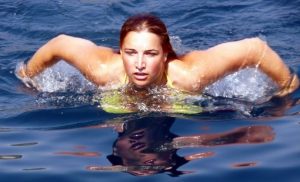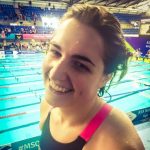It was a particularly traumatic morning where I had woken up feeling awful and had been lamenting, amongst other things, the fact that the process of recovery from overtraining was dull. I had taken measures to reduce my pool hours until clear signs of improvement started to appear and as a result I was left with a lot of unallocated time. I was bored and at a loose end. An hour or so later, rationality began to creep back in and I had the following message exchange with my coach:
 “Erm…I thought about this some more and actually it takes up about half a day with the Pilates and stretching and rolling on the floor so I’m not even sure boredom and free time will be an issue.”
“Erm…I thought about this some more and actually it takes up about half a day with the Pilates and stretching and rolling on the floor so I’m not even sure boredom and free time will be an issue.”
“So your plan to take up the spare time after training is…training!”
“I lied about the spare time.”
“Coaching you is hilarious.”
For a long time I depended on my training sessions to provide routine and was therefore resistant to alterations or amendments to them as I saw this as a loss of routine and structure. I felt like recovery was a sort of void, creating holes in my life, periods of nothingness that would disturb me and disrupt the structure of my day. On a morning where I woke up to a red HRV reading; signaling no pool session, I was suddenly confronted with a few hours of unanticipated free time – not training time.
My initial reaction to this was to find other things to fill my day; friends, work, new hobbies etc. But this approach always felt slightly flawed. I would often end up extremely busy on days when I should definitely have been taking it easy. I also felt that I was neglecting my athletic development and this made it very hard for me to feel good about taking a rest day. I still wasn’t understanding recovery properly nor taking it seriously. I was only being an athlete when I was at the pool or the gym. As soon as I was out of these environments I switched off to my athletic development and stopped thinking about how best to develop my body and mind.
I would never have cancelled a Tuesday morning pool session for the sake of coffee with a friend but having decided I wouldn’t be going to the pool I would regularly trot off to socialise with people in those ‘pool’ hours. I wasn’t equating ‘not-swimming’ with actively recovering, I was equating it with free time. I used to think that all the time I wasn’t swimming was ‘free-time’ and therefore on rest and recovery days I had an abundance of this ‘free-time’. In reality of course, not going to the pool is just a choice to do a different type of training it isn’t free time at all. I invested much thought and energy into making good decisions about my training, what type of pool or gym session I would complete each day, what intensity to train at and whether I would work out or rest. However, I was never actively doing anything to recover. When ithlete told me to ‘go for it’ I would hop off to the pool for a sprint session and when amber I would make sure that my session remained aerobic but when red I would do nothing. Worse than nothing, I would then perceive the sudden appearance of a couple of free hours in my day and say yes to things with high energy demands that I couldn’t have done on a pool day. This unsurprisingly often led to sub-optimal recovery. It is also arguably one of the factors that lead me to a state of overtraining.
I had always felt like my routine was dictated by pool and gym hours. Strangely I had never set myself recovery hours. Never set aside any portion of the day for doing things to promote recovery; napping, meditating, visualisation etc. and subsequently recovery was being neglected. The irony then, of complaining of free time, when there were already more swimming related jobs for me to be doing than I was fitting into a day.
Recovery is an involved and positive process rather than an absence of activity. I started prioritising it, on days of low HRV I cancelled any engagements that I knew would contribute to fatigue. Instead of saying yes to breakfast with a friend because I wasn’t training and therefore ‘had the time,’ I said no and prioritised meditation, visualisation, rehabilitation and stretching exercises. A few weeks of this and the improvement in my mental and physical condition was marked.
Now whether pool, or gym, or neither, my sporting (and arguably general life) objectives for each day are the same, to finish the day in the best possible mental and physical condition. I have structured my days around my sport and in the past when we were developing my training program I understood that as being a commitment to spend certain hours at the pool every day. However, I now realise that that time is not ‘pool-time’ it is time committed to athletic development. It is not activity specific, it is time I have dedicated to becoming a faster swimmer. Where I spend these hours is free to change. The time I had set aside for getting faster over fifty metres every day remains dedicated to getting faster over fifty metres but the exact activity that fills that time can change. Training sessions are not the goal they are a tool; on days that you are ready it is training that will stretch you and stimulate physical growth and improvement. But there is an entire workshop of other tools at your disposal that will be more appropriate and effective in other situations.
There are always things that you can do that require time and will contribute to your athletic development which means that there is no ‘loss of routine’ just because you are not going to the pool or the gym. Sometimes what you need to do looks a lot like a non-thing, for example taking a nap or sitting quietly on your own for a while but these are of utmost importance. We go to a lot of trouble to carve out time for training in our already busy lives, we mustn’t abandon these sacred hours and let them become swallowed up by other activities as soon as we aren’t partaking in a physical training session. This is our recovery time. It is the time in which we actually improve and it should be as precious to us as any session at the gym.
Find the full ‘Why does it remain so difficult to recover?’ series here.
About Georgina
 Georgina is a full-time athlete, sprint-swimmer based in the UK. Born in 1993 in Islington, London she moved in the summer of 1996 to rural Cheshire where she lived until early 2014 when she moved to Moscow. She spent the following two and a half years in Russia and returned to the UK at the end of September 2016.
Georgina is a full-time athlete, sprint-swimmer based in the UK. Born in 1993 in Islington, London she moved in the summer of 1996 to rural Cheshire where she lived until early 2014 when she moved to Moscow. She spent the following two and a half years in Russia and returned to the UK at the end of September 2016.
She is an accomplished all-round athlete having competed in multi-event athletics and alpine ski-racing.
After leaving school with A levels in Maths, Further Maths, Physics, English Literature and Art she began a Civil Engineering MSc course at the University of Bath in England before deferring her course in late 2011 in order to focus her activities on swim sprint racing.
When not training, eating and sleeping Georgina teaches flute, plays the piano and sings in various choirs and ensembles. She is currently involved in the building of a house in Birmingham and continues to study and learn to speak Russian. You can follow Georgina on Twitter or Instagram.
